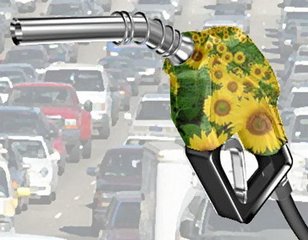Renewable diesel is a hydrocarbon diesel fuel produced from renewable feedstocks. Today, all renewable diesel on the market is, like biodiesel, produced from fats and oils. That the way of these fats and oils are reacted into fuels is the defining difference between biodiesel and renewable diesel. As discussed above, biodiesel is primarily made through esterification.

Renewable diesel is produced by hydro processing of fats and oils. Hydro processing produces alkanes, which are chemically identical to some of the compounds found in conventional diesel fuel. The properties of renewable diesel are also different from biodiesel. Like biodiesel, renewable diesel has near-zero aromatic content and very low sulfur content. It typically has a very high cetane number and a cloud point more like conventional diesel fuels. When used as a neat fuel (RD100), RD100 qualifies as an EPACT alternative fuel, while lower blends, such as RD20, do not.
The only way to determine, if diesel fuel has been blended with renewable diesel fuel through carbon dating using ASTM D6866. In this method, the iso-topic ratio of fossil to biological carbon is quantified. Petroleum diesel will be wholly fossil carbon, while the renewable diesel (or biodiesel) content will be identified as biogenic carbon.
Biodiesel is a high-quality clean diesel, can be extracted from a variety of biomass, so it can be said to be inexhaustible energy. In the increasingly depleted resources today, is expected to replace the oil as an alternative fuel.
Diesel is a large number of large-scale vehicles such as trucks and diesel locomotives and generators, the main power fuel, which has the advantages of large power, low price, the Chinese diesel demand is very large, diesel applications, the main problem of “black smoke”, we often see in the road black smoke truck.
The main reason for black smoke is incomplete combustion, serious air pollution, such as the production of a large number of particulate dust, CO2 emissions higher.
And diesel emissions are much more polluting than gasoline, so people have developed diesel substitutes-biodiesel.